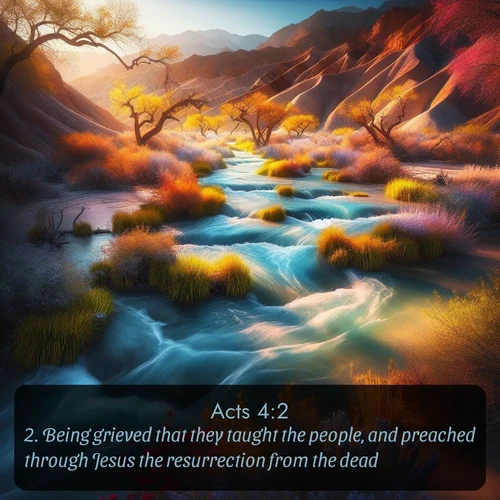Acts 4:2 plusieurs versions / traductions
English Bible Translations
2. Being grieved that they taught the people, and preached through Jesus the resurrection from the dead.
2. being sore troubled because they taught the people, and proclaimed in Jesus the resurrection from the dead.
2. Being greatly troubled because they were teaching the people and preaching Jesus as an example of the coming back from the dead.
2. being distressed on account of their teaching the people and preaching by Jesus the resurrection from among [the] dead;
2. Being grieved that they taught the people, and preached through Jesus the resurrection from the dead.
2. being grieved because of their teaching the people, and preaching in Jesus the rising again out of the dead --
German Bible Translations
2. (sie verdroß, daß sie das Volk lehrten und verkündigten an Jesu die Auferstehung von den Toten)
2. Die verdroß es, daß sie das Volk lehrten und in Jesus die Auferstehung von den Toten verkündigten.
French Bible Translations
2. Ils étaient excédés parce que les apôtres enseignaient le peuple et annonçaient la résurrection des morts dans la personne de Jésus.
2. mécontents de ce qu’ils enseignaient le peuple, et annonçaient en la personne de Jésus la résurrection des morts.
2. mécontents de ce qu'ils enseignaient le peuple, et annonçaient en la personne de Jésus la résurrection des morts.
2. étant en peine de ce qu'ils enseignaient le peuple et annonçaient par Jésus la résurrection d'entre les morts.
2. Etant en grande peine de ce qu'ils enseignaient le peuple, et qu'ils annonçaient la résurrection des morts au Nom de Jésus.
2. Étant fort en peine, et de ce qu'ils enseignaient le peuple, et de ce qu'ils annonçaient la résurrection des morts en Jésus.
Versions with Strong Codes
Acts 4 / KJV_Strong2. Being grieved[G1278] that they[G846] taught[G1321] the[G3588] people,[G2992] and[G2532] preached[G2605] through[G1722] Jesus[G2424] the[G3588] resurrection[G386] from[G1537] the dead.[G3498]
Strong Code definitions
G1278 diaponeo/dee-ap-on-eh'-o from G1223 and a derivative of G4192; to toil through, i.e. (passively) be worried:--be grieved. see G1223 see G4192
G846 autos/ow-tos' from the particle au (perhaps akin to the base of G109 through the idea of a baffling wind) (backward); the reflexive pronoun self, used (alone or in the comparative 1438) of the third person , and (with the proper personal pronoun) of the other persons:--her, it(-self), one, the other, (mine) own, said, (self-), the) same, ((him-, my-, thy- )self, (your-)selves, she, that, their(-s), them(-selves), there(-at, - by, -in, -into, of, -on, -with), they, (these) things, this (man), those, together, very, which. Compare 848. see G109 see G1438 see G848
G1321 didasko/did-as'-ko a prolonged (causative) form of a primary verb dao (to learn); to teach (in the same broad application):--teach.
G3588 ho/ho, including the feminine to to in all their inflections; the definite article; the (sometimes to be supplied, at others omitted, in English idiom):--the, this, that, one, he, she, it, etc.
G2992 laos/lah-os' apparently a primary word; a people (in general; thus differing from G1218, which denotes one's own populace):--people. see G1218
G2532 kai/kahee apparently, a primary particle, having a copulative and sometimes also a cumulative force; and, also, even, so then, too, etc.; often used in connection (or composition) with other particles or small words:--and, also, both, but, even, for, if, or, so, that, then, therefore, when, yet.
G2605 kataggello/kat-ang-gel'-lo from G2596 and the base of G32; to proclaim, promulgate:-declare, preach, shew, speak of, teach. see G2596 see G32
G1722 en/en a primary preposition denoting (fixed) position (in place, time or state), and (by implication) instrumentality (medially or constructively), i.e. a relation of rest (intermediate between 1519 and 1537); "in," at, (up-)on, by, etc.:-about, after, against, + almost, X altogether, among, X as, at, before, between, (here-)by (+ all means), for (... sake of), + give self wholly to, (here-)in(-to, -wardly), X mightily, (because) of, (up-)on, (open-)ly, X outwardly, one, X quickly, X shortly, (speedi-)ly, X that, X there(-in, -on), through(-out), (un-)to(-ward), under, when, where(with), while, with(-in). Often used in compounds, with substantially the same import; rarely with verbs of motion, and then not to indicate direction, except (elliptically) by a separate (and different) preposition. see G1519 see G1537
G2424 Iesous/ee-ay-sooce' of Hebrew origin (3091); Jesus (i.e. Jehoshua), the name of our Lord and two (three) other Israelites:--Jesus. see H3091
G3588 ho/ho, including the feminine to to in all their inflections; the definite article; the (sometimes to be supplied, at others omitted, in English idiom):--the, this, that, one, he, she, it, etc.
G386 anastasis/an-as'-tas-is from G450; a standing up again, i.e. (literally) a resurrection from death (individual, genitive case or by implication, (its author)), or (figuratively) a (moral) recovery (of spiritual truth):--raised to life again, resurrection, rise from the dead, that should rise, rising again. see G450
G1537 ek/ek a primary preposition denoting origin (the point whence action or motion proceeds), from, out (of place, time, or cause; literal or figurative; direct or remote):--after, among, X are, at, betwixt(-yond), by (the means of), exceedingly, (+ abundantly above), for(- th), from (among, forth, up), + grudgingly, + heartily, X heavenly, X hereby, + very highly, in, ...ly, (because, by reason) of, off (from), on, out among (from, of), over, since, X thenceforth, through, X unto, X vehemently, with(-out). Often used in composition, with the same general import; often of completion.
G3498 nekros/nek-ros' from an apparently primary nekus (a corpse); dead (literally or figuratively; also as noun):--dead.
Prédications qui analysent les thèmes Actes 4
Thèmes : La guérison d'un paralytique; Pierre et Jean devant le Sanhédrin; Menaces et prière; La communauté des croyantsActes #6: Pas de duplicité dans l'Eglise
Actes #5: Personne d’autres que Jésus. Actes chapitre 4
Related Sermons discussing Acts 4
Themes : La guérison d'un paralytique; Pierre et Jean devant le Sanhédrin; Menaces et prière; La communauté des croyantsActs #6: No duplicity in the Church. Acts 4:32-5:11 (Acts 4); Patrice Berger
Acts #5: None other than Jesus. Acts chapter 4
see also: Bible Key Verses ; KJV Bible Images, BBE Bible images

